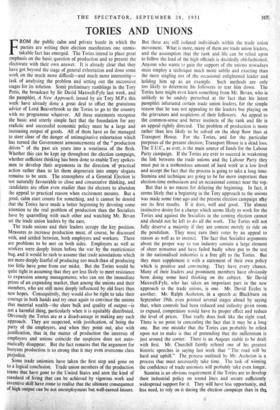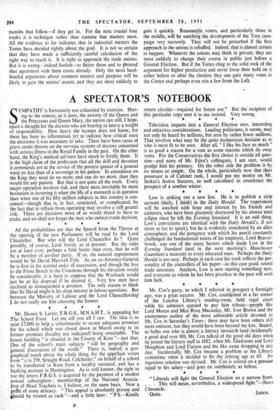TORIES AND UNIONS
F ' ROM the public calm and private bustle in which the parties are writing their election manifestoes One unmis- takable fact has emerged. The Tories intend to place great emphasis on the basic question of production and to present the electorate with their own answer. It is already clear that they have got beyond the stage of general exhortation and done some work on the much more difficult—and much more interesting— task of analysing the problem and setting out the successive_ stages for its Solution. Some preliminary rumblings in the Tory Press, the broadcast by Sir David Maxwell-Fyfe last week, and the pamphlet, A New Approach, issued by six Tory M.P.s this week have already done a great deal to offset the gratuitous advice of Lord Beaverbrook to the Tories to go to the country with no programme whatever. All these statements recognise the basic and utterly simple fact that the foundation for any realistic and successful economic policy must be a large and increasing output of goods. All of them have so far managed to steer clear of the danger of unimaginative exhortation which has turned the Government announcements of the "production drives" of the past six years into a weariness of the flesh. Whether this can be kept up throughout the election campaign, whether sufficient thinking has been done to enable Tory spokes- men to develop their arguments in the direction of -practical action rather than to let them degenerate into empty slogans remains to be seen. The atmosphere of a General Election is not naturally favourable to close and consecutive thinking, and zandidates are often even readier than the electors to abandon the appeal to practical reason when excitement mounts. But a good, calm start counts for something, and it cannot be denied that the Tories have made a better beginning by devoting some attention to the real problem of production than the Socialists have by quarrelling with each other and watching Mr. Bevan set the trade union leaders by the ears.
The trade unions and their leaders occupy the key position. Measures to increase production must, of course, be discussed with, and settled between, both employers and workers. There are problems to be met on both sides. Employers as well as workers were deeply bitten before the war by the restrictionist bug, and it would be rash to assume that trade associations which are more deeply fearful of producing too much than of producing too little have gone from our midst. But the Tories would be quite right in assuming that they are less likely to meet resistance to expansion among managements, who can see the immediate prizes of an expanding market, than among the unions and their members, who are still more deeply influenced by old fears than new hopes. Consequently, they would also be right to take their courage in both hands and try once again to convince the unions that material wealth—the sheer bulk and quality of output—is not a harmful thing, particularly when it is equitably distributed. Obviously the Tories are at a disadvantage in making any such approach. They are suspected, with justification, of being the party of the employers, and when they point out, also with justification, that iti, the matter of production the interests of employers and unions coincide the suspicion does not auto- matically disappear. But the fact remains that the argument for buoyant production is so strong that it may even overcome class prejudice.
Some trade unionists have taken the first step and gone on to a logical conclusion. Trade union members of the production teams that have gone to the United States and seen the kind of standard of living that can be achieved by vigorous work and inventive skill have come to realise that the ultimate consequence of high output can be not unemployment but well-earned leisure. But these are still isolated individuals within the trade union' movement. What is more, many of them are trade union leaders, and the assumption that the rank and file can be relied upon to follow the lead of the high officials is decidedly old-fashioned. Anyone who wants to gain the support of the unions nowadays must employ a technique much more subtle and exacting than the mere singling out of the occasional enlightened leader and , holding him up as an example. Such methods are only too likely to determine his followers to tear him down. The Tories here might even learn something from Mr. Bevan, who is unlikely to be unduly -perturbed at the fact that his latest pamphlet infuriated certain trade union leaders, for the simple reason that he was not appealing to the leaders but playing on the grievances and suspicions of their followers. An appeal to the common-sense and better instincts of the rank and file is an appeal rightly directed. The problem of production is more rather than less likely to be solved on the shop floor than at Transport House. For the Tories, and for the particular purposes of the present election, Transport House is a dead loss. The T.U.C., as ever, is the main source of funds for the Labour Party campaign. If the Tories are ever to succeed in weakening the link between the trade unions and the Labour Party they must put in a trethendous amount of hard work at a low level and aecept the fact that the process is going to take a long time; Stamina and technique are going to be far more important than election-time enthusiasm and an occasional contact near the top.
But that is no reason for delaying the beginning. In fact, it seems likely that a beginning in the Tory approach to the unions was made some time ago and the present election campaign rdtty see its first results. If it does, well and good. The almost instinctive desire for a change which seems likely to work for the Tories and against the Socialists in the coming election cannot and should not be left to do all the work. The Tories will not fully deserve a majority if they are content merely to ride on the pendulum. They must earn their votes by an appeal to reason as well as to instinct. The fact that Socialist arguments about the proper way to run industry contain a large element of sheer nonsense and have failed badly when put to the test in the nationalised industries is a free gift to the Tories. But they must supplement it with a statement of their own policy which is positive and convincing. They have every chance. Many of their leaders and prominent members have obviously been doing some hard thinking on the subject. Sir David Maxwell-Fyfe, who has taken an important part in the new approach to the trade unions, is one. Mr. David Eccles is another. Mr. Ralph Assheton, in a speech at Blackburn on September 19th, even pointed several stages ahead by saying that, when controls had been reduced and industry given room to expand, competition would have its proper effect and reduce the level of prices. That really does look like the right road. There is no point in concealing the fact that it may be a long one. But one mistake that the Tories can probably be relied upon not to make is that of pretending that the millennium is just around the corner. There is an Augean stable to be dealt with first. Mr. Churchill faintly echoed one of his greatest historic speeches in saying last week that "The road will be hard and uphill." The process outlined by Mr. Assheton is a process that must necessarily take time. The task of winning the confidence of trade unionists will probably take even longer.
Stamina is an obvious requirement if the Tories are to develop their industrial policy on sound lines and secure sufficiently widespread support for it. They will have less opportunity, and less need, to rely on it during the election campaign than in tlui months that follow—if they get in. For le next crucial four weeks it is technique rather than stamina that matters most. All the evidence so far indicates that in industrial matters the Tories have decided rightly about the goal. It is not so certain that they have made a sufficiently careful calculation of the right way to reach it. It is right to approach the trade unions. But it is wrong—indeed foolish—to flatter them and to tiretend that agreement with them exists already. Only the most hard- headed arguments about common interest and purpose will be Jikely to gain the unions' assent, and they are most unlikely to gain it quickly. Reasonaple voters, and particularly those in the middle, will be watching the development of the Tory cam- paign very narrowly. They will not be perturbed if the first approach to the unions- is rebuffed. Indeed, that is almost certain to happen. Whatever the unions may think in private, they are most unlikely to change their course in public just before a General Election. But if the Tories cling to the solid rock of the argument for higher production and never loose their hold on it either before or after the election they can gain many votes in the Centre and perhaps even win a few from the Left.



































 Previous page
Previous page